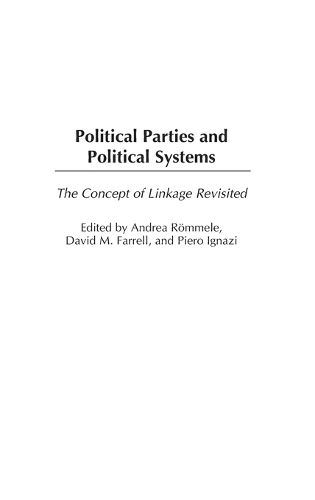Readings Newsletter
Become a Readings Member to make your shopping experience even easier.
Sign in or sign up for free!
You’re not far away from qualifying for FREE standard shipping within Australia
You’ve qualified for FREE standard shipping within Australia
The cart is loading…






Since its release in 1980, Kay Lawson’s Political Parties and Linkage: A Comparative Perspective has become a classic text in the field of political science. In her groundbreaking work Lawson approaches linkage from an angle left unexplored by her predecessors. Her thinking filled in the systematic and theoretical void by envisioning political parties as the link between citizens and policy makers. This collection of essays by leading political scientists reflects on Lawson’s concept of linkage, its theory, and its application over the last quarter century. The work is divided into two sections, the first covers linkage’s impact on party research and the second focuses on its application in general political science. The first looks at such topics as the evolution and intellectual development of Lawson’s concept through social actors, policy responsiveness, and multi-layer politics. The second handles issues like globalization, the relation of state and society, the European Union and it’s proposed constitutional reform, and the cross-cultural significance of linkage in such countries as India. The book concludes with an illuminating chapter by Lawson that responds to the featured themes and explains her current views on linkage and democracy.
$9.00 standard shipping within Australia
FREE standard shipping within Australia for orders over $100.00
Express & International shipping calculated at checkout
Since its release in 1980, Kay Lawson’s Political Parties and Linkage: A Comparative Perspective has become a classic text in the field of political science. In her groundbreaking work Lawson approaches linkage from an angle left unexplored by her predecessors. Her thinking filled in the systematic and theoretical void by envisioning political parties as the link between citizens and policy makers. This collection of essays by leading political scientists reflects on Lawson’s concept of linkage, its theory, and its application over the last quarter century. The work is divided into two sections, the first covers linkage’s impact on party research and the second focuses on its application in general political science. The first looks at such topics as the evolution and intellectual development of Lawson’s concept through social actors, policy responsiveness, and multi-layer politics. The second handles issues like globalization, the relation of state and society, the European Union and it’s proposed constitutional reform, and the cross-cultural significance of linkage in such countries as India. The book concludes with an illuminating chapter by Lawson that responds to the featured themes and explains her current views on linkage and democracy.